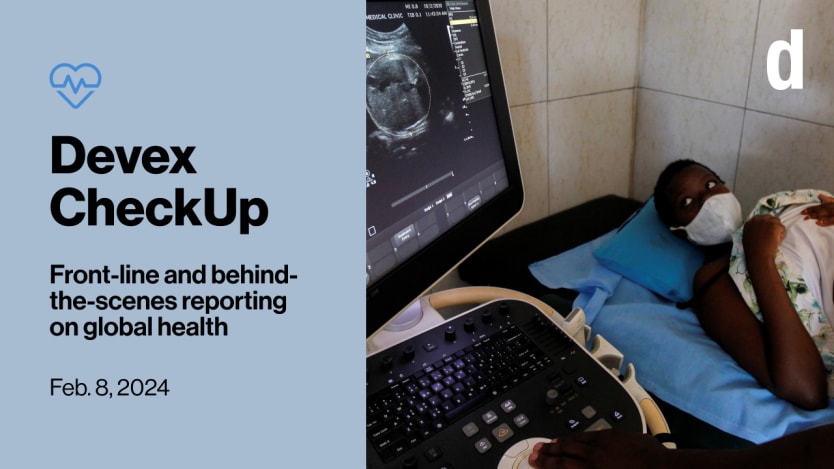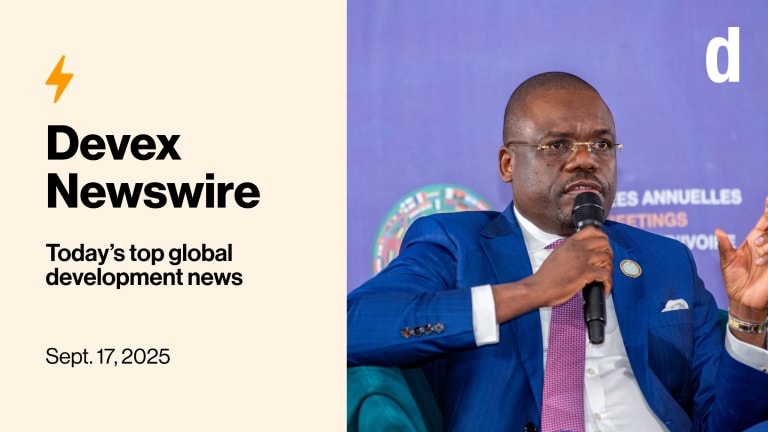Presented by MedAccess

Remember when high-income countries were donating nearly expired COVID-19 vaccine doses? It ended up becoming such a waste as several lower-income countries had to destroy them because they couldn’t distribute them fast enough or rejected them due to their short shelf life.
Such ill-conceived donations have long been happening with gifted medical devices in the global south and increased amid the COVID-19 pandemic.
The donations are meant to fill a gap. Many health facilities lack even the most basic equipment, such as blood pressure monitors and X-ray machines. In a project conducted by Seattle-based NGO PATH, they found fewer than 50% of 800 health facilities in Burkina Faso, Indonesia, Kenya, and Malawi had these types of devices. And when COVID-19 hit, governments were eager to accept donated equipment out of desperation to save lives.
This is a preview of Devex CheckUp
Sign up to this newsletter for exclusive global health news and insider insights, in your inbox every Thursday.
But donors’ lack of coordination, local consultation, and consideration of the capacities of health workers who will be using the donated equipment has created problems, my colleague Andrew Green reports. Some countries end up with more than 80 different types of the same device that health workers aren’t trained to operate. When the equipment breaks, there are no spare parts or anyone to contact for repair, leaving health facilities no choice but to throw it away.
There are available guidelines governing biomedical equipment donations, including some from the World Health Organization. But they are poorly implemented. U.N. agencies such as UNICEF and WHO are often supposed to take responsibility for implementation and maintenance, but observers tell Andrew that support either arrives too late or not at all.
For many of these donations, it’s a case of good intentions gone wrong. To fix the situation, some organizations are looking at how to better enforce existing guidelines. PATH is working with governments to develop strategies for receiving donated equipment, as well as redistributing the equipment governments receive to places where it can be of use.
I'm curious to hear your insights on other potential solutions. Send me a message at checkup@devex.com.
Read: Good intentions, bad outcomes— the dangers of donated medical devices
A breath-through
One commodity that’s always in demand, but often lacking or in limited quantities in many health facilities across Africa, is medical oxygen. Demand for it surged during the COVID-19 pandemic — and more than doubled in countries like Kenya. With demand so high, oxygen supplies sometimes ran out and left some patients without it.
That could happen again in a future pandemic. But there are people taking action now to help prevent that.
Dr. Bernard Olayo, founder of African startup Hewatele, is one of them. He is building a $20 million liquid oxygen plant on the outskirts of Nairobi to produce 20 metric tons of oxygen per day, writes Devex Senior Reporter Sara Jerving. His goal is to increase the quantity of locally produced oxygen in Kenya and sell it for one-third of the cost of imported oxygen, which is currently priced at about 250 to 300 Kenyan shillings per liter.
The project is getting support from international funders. The U.S. International Development Finance Corporation and Grand Challenges Canada are providing the company with a combined loan of $11.1 million. The Soros Economic Development Fund, Finnfund, and UBS Optimus Foundation are also making equity investments in the company totaling $9.1 million.
While Olayo’s mission is to produce more oxygen to meet domestic needs, he hopes it can be replicated in other African countries, many of which don’t have their own liquid oxygen plants.
Read: A Kenyan doctor's $20M mission to make sure every child has oxygen
3 tips to network with confidence
I’ve been to so many global health events, including the World Health Assembly, and one thing I struggle with is networking. With so many people and events, how do you make a meaningful connection?
A colleague advised me to ask people how they got into their line of work — certainly a key conversation starter. But here are other tips from global development career coaches:
Plan ahead. Events can be a good opportunity to widen your network, raise awareness about a project, or win funding. Finding out who is going to an event ahead of time and making contact before you go is a good starting point, according to Simone Anzböck, a former senior international development practitioner who now coaches professionals in the sector.
Take notes. When people give out business cards, Anzböck says, “Write down on the back the day and the place that you met them, what the connection was. This really helps with follow-up.”
If you’re attending virtually, write down the names of people and connect with them later by reaching out via LinkedIn or email. “Mention they said something that resonated with you, or just that you saw them at the event, and ask them how they found it to start a conversation,” says Ellen Johnson, a career and leadership coach for global development professionals.
Set a goal. It can get overwhelming when you’re in a crowded space. It’s good to identify one outcome to prioritize. “Think before you go in: If I only accomplish this one thing at this event, I will be happy,” Johnson says.
What's your no-fail networking tip? Tell us and we might feature it in future CheckUp editions.
Read more: How to approach networking at global development's top events (Career)
+ A Devex Career Account includes all the valuable tools you need to be successful in your globaldev job hunt. Start your 15-day free trial today.
Breaking an impasse
WHA is just about three months away, which means member states have a very limited window to agree on a pandemic treaty. With so much division, experts worry about what three months can accomplish that two years couldn’t.
Some are proposing a framework convention — similar to the Framework Convention on Tobacco Control — that could break the impasse and allow for a historic binding treaty. For one, a framework convention enables parties to agree to core values such as pathogen access and benefit sharing, financing, and accountability in May, while allowing them to negotiate binding duties in the future.
“There would thus be less political tension in adopting the initial framework convention, as parties could approach negotiations and discussion on the most contentious portions incrementally,” Lawrence Gostin, Sam Halabi, and Olohikhuae Egbokhare write in an opinion piece for Devex.
Opinion: Imagine a health COP getting as much attention as climate COPs
What we’re reading
The Brazilian city of Rio de Janeiro has declared dengue as a public health emergency, after registering more than 10,000 cases since the start of 2024. [NBC News]
Burkina Faso is the second African country to introduce the RTS,S malaria vaccine in its routine immunization program. [Africanews]
In Myanmar’s Kayah state, doctors are treating the wounded in hidden hospitals to avoid air raids. [Al Jazeera]








